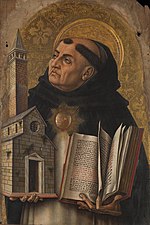Portal:Catholic Church/Biography Archive/August 2007

Saint Thomas Aquinas (also Thomas of Aquin, or Aquino; c. 1225 – 7 March 1274) was an Italian Roman Catholic priest in the Order of Preachers, a philosopher and theologian in the scholastic tradition, known as Doctor Angelicus, Doctor Universalis and Doctor Communis. He is the foremost classical proponent of natural theology, and the father of the Thomistic school of philosophy and theology. St. Thomas is held in the Roman Catholic Church to be the model teacher for those studying for the priesthood (Code of Canon Law, Can. 252, §3). The work for which he is best-known is the Summa Theologica. One of the 33 Doctors of the Church, he is considered by many Roman Catholics to be the Church's greatest theologian. Consequently, many institutions of learning have been named after him.
- "Nihil est in intellectu quod non sit prius in sensu." (Nothing is in the intellect that was not first in the senses) – Aquinas's peripatetic axiom
The philosophy of Aquinas has exerted enormous influence on subsequent Christian theology, especially that of the Roman Catholic Church, extending to Western philosophy in general, where he stands as a vehicle and modifier of Aristotelianism. Philosophically, his most important and enduring work is the Summa Theologica, in which he expounds his systematic theology.